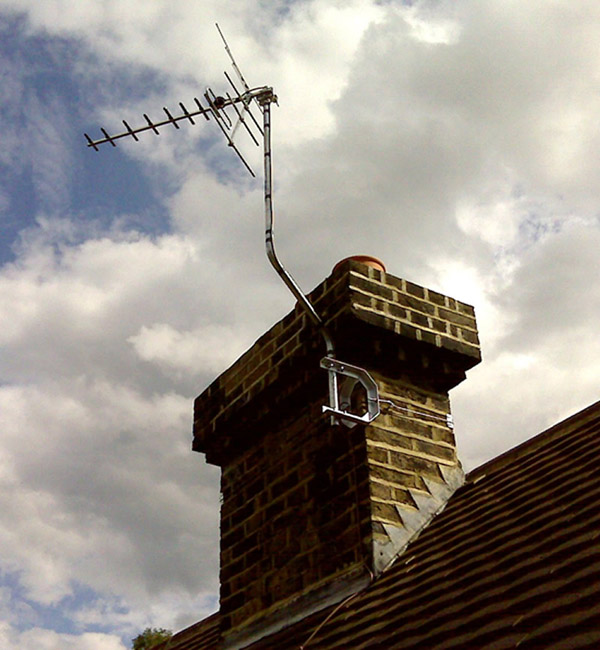
My first thought was, he lied in every word…1
As the television licence is in the news again, now might be a good time to describe my strange and illuminating experiences with TV Licensing.
For around twelve years they wrote to me every six weeks or so. I didn’t have a television and wasn’t using any other ‘television receiving equipment’.
As well as letters, there were mocked-up bills, pamphlets, messages folded in that thin paper banks sometimes send confidential information in, and messages in a typewriter font that looked like they’d come straight from the teletype. Some were written in the sort of cod legalspeak you might use when creating fake documents for a school history project; all that was lacking was some tea staining for extra age and authority. Mostly they tried to scare me, and they went in hard from the beginning.
It all seemed bogus, so I ignored them.
TV Licensing took my silence seriously; very, very seriously. An investigation was opened; the investigation was reaching its final stages; a visit for an interview under caution had been authorised.
And then a funny thing happened. After a while, I was again told that an investigation had been opened; that this investigation was reaching its final stages; that a visit had again been scheduled. I started keeping the letters (some people collect stamps) and apparently an investigation was opened at least 24 times.
But cycle after investigative cycle passed without anyone actually swinging by and asking me if I watched television. The closest I came to having my collar felt was when a leaflet with ‘We said we’d call’ printed on the front was pushed through my letterbox, with the date and time written in by hand. The usual fist-shaking ended with the bold red statement ‘Get a licence before you get another knock on your door’. As it happens, I had been in and my door hadn’t been knocked on.
Then, after my third change of address, but still in roughly the same area of the same city, the flow of correspondence suddenly ended. I still didn’t have a TV or a licence and I had never communicated with TV Licensing in any way.
On the face of it, this might seem baffling or to be good material to support your world view—e.g. some people assume that most organs of the state are simultaneously Orwellian and incompetent—but if you understand the licensing set-up it makes easy sense.
In law, the BBC is the licensing authority, but TV Licensing is a trading name used by the private companies that administer the licence fee, with Capita Business Services Ltd running the collection and enforcement side since 2002. Proximity London Ltd and their partners (in particular, AMV BBDO, the ‘UK’s most creative agency’) handle marketing and the like.
TV Licensing is an outsourcing consortium running a tax farming operation; a very modern incarnation of something very ancient. It uses contemporary business practices to maximise revenue and minimise costs, as required by its client, the BBC.
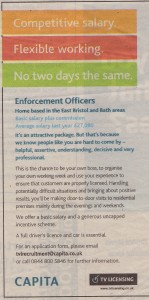
If TV Licensing likes the language of the courtroom and gives some of its staff official-sounding monikers (‘enforcement officers’), this has little more legal relevance than the Salvation Army’s calling itself an army and using military ranks.
Enforcement officers have no special powers or right of access to your home and you can prevent them from even knocking on your door by withdrawing their common law implied right of access. They can apply for a search warrant, but refusal to grant them entry and general non-cooperation are not grounds for one; positive evidence of evasion is required. They cannot execute warrants without the police. If you admit them, they can interview you under caution.
TV Licensing can initiate prosecutions, and indeed currently prosecute around 180 000 people per annum. They say it’s the last resort, and two former Capita employees told me that this is true; they just want the money and would prefer not to have the bother and expense of a prosecution. If a licence evader is aware of the law, moderately careful, and not tremendously unlucky, prosecution should be difficult. (This article argues that this is a considerable understatement.) It seems likely that many convictions rely on a confession in the statement taken by the enforcement officer. The high number of prosecutions suggests that there are a lot of licence evaders who are both financially desperate (literally cannot pay when caught to avoid court) and ignorant of the law.
Enforcement officers work for a basic salary plus commission, meaning they benefit from getting a ‘result’, preferably a licence sale but a successful prosecution will do2. They don’t operate in teams from dark, menacing vans full of winking lights and enigmatic machinery, they work on their own and use their own cars; the job ads say ‘This is the chance to be your own boss’. (The fabled detection equipment has, according the National Audit Office, ‘been used in conjunction with targeted advertising to act as a visible deterrent.’ There’s no mention of it actually detecting anything.) They are essentially door-to-door salesmen backed by highly circumscribed coercive powers.
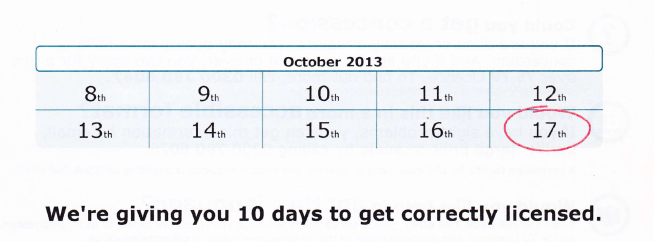
Working in parallel with enforcement is the direct marketing campaigning3. Once you understand that TV Licensing’s letters4 are essentially marketing material, they make more sense. Their primary purpose is not to inform or advise, but to influence, mostly through fear. They aren’t written to you specifically; they are mass mailings. They aren’t written by officials, but by advertising copywriters as part of ‘award-winning’ direct marketing campaigns. As with all advertising, not everything in them is to be taken at face value or trusted. Unlike most advertising, they try to make the client look worse than it is; by cultivating a sinister Orwellian mien they disguise their relative powerlessness—they’re like the Wizard of Oz hiding behind his curtain and putting on a show of sound and fury. They also, of course, use more conventional advertising techniques, such as creating an artifical sense of urgency (10 days to get licensed! Sale ends 17 October! Everything must go!).
Despite all this, and despite their interesting and complex relationship with the truth5, because of the special status of TV Licensing, they do not come under the purview of the Advertising Standards Authority and are effectively unregulated.
TV Licensing’s main enforcement and marketing tool is its database containing millions of addresses; it checks this against its record of licensed addresses and then, employing what the Select Committee on Culture, Media and Sport referred to in 2004 as ‘a crude and damaging assumption that every household must be in possession of a TV set’, it goes for those addresses that aren’t licensed.
This is why they wrote to me for twelve years, and this is why they stopped: it turned out that for some reason my new address wasn’t listed by the Post Office, who developed the database.
In isolation, my years of fruitless correspondence from TV licensing may seem wasteful, stupid, insolent and harrassing, but in operational terms, as an exercise in using contemporary business techniques to achieve a given end in a cost-effective way, it makes perfect sense. Enforcing the tax scrupulously would simply be too expensive and any criticism that doesn’t address that misses the point.6
The one puzzle is why I wasn’t bothered by enforcement officers over such a long period, given that they make enough visits to prosecute a whole lot of people every year. One possibility is this. The enforcers work on commission and so want to make most efficient use of their time. Perhaps my postcode’s demographic profile didn’t match what they were looking for. Although I lived in an inexpensive flat, the area was affluent and contained an unusually large proportion of graduate professionals.
There are persistent accusations that TV Licensing target groups for best results, namely people who are (in the parlance of our times) vulnerable (see e.g. here). Whether this is individual bad practice or policy or somewhere in between isn’t clear. In 2019 (in fairness, after my dealings with TV Licensing ended), The Times reported that ‘TV Licensing enforcers are experimenting with new tactics to deter evasion. One trial involves “intensive visits in a specific geographic area” to scare local people into paying.’7 How the areas are selected wasn’t discussed.
There are strange demographic skews—more than 70% of TV Licensing’s prosecutions are against women—and for obvious reasons there’s a lot of what you might call punching down (see here for a sample day in court). The former Culture Secretary, John Whittingdale, said that ‘There is no reason why women would be evading the TV licence more so it is clearly the enforcement process which is disproportionately resulting in women being prosecuted.’
The 2015 Perry Report found that ‘On the evidence available it has not been possible to reach any definitive conclusion to explain the reason for this gender imbalance.’ It was suggested that women might answer the door more often and be more cooperative, opening themselves up to prosecution, but it recommended that the question should be further investigated. (It doesn’t seem to have been.) Others have suggested that lone parents are targeted (or at least disproportionately affected), and that there are many more single mothers than single fathers.
TV Licensing always deny that they or their enforcers target in this way. However, given the evidence, the incentives and how they operate, it doesn’t seem an entirely outrageous speculation and it might, after all, explain why in twelve years they didn’t ever doorstep me.8
I suppose there is still one final question you might want to ask: why didn’t I just tell them I didn’t have a television?
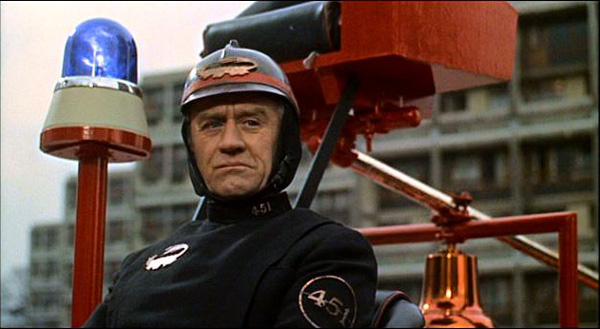
Now, I actually support public service broadcasting and even feel a bit of public spirit from time to time, but my first contact from them was an aggressive fake bill. If I didn’t have a TV I was supposed to write to them9 and then be visited for an interview and inspection. This would be repeated periodically to check nothing had changed. I didn’t like the way they operated and I didn’t see why I should write to them every time I moved to tell them I didn’t have a television, nor did I see why I should submit to regular visits. There’s no common law or statutory duty to cooperate, it’s purely voluntary, so they should at least ask nicely10. I also hated the reversal of the presumption of innocence just for their operational convenience, because the scheme would be impossible, or at least very difficult, to run otherwise; ‘Necessity is the plea for every infringement of human freedom. It is the argument of tyrants; it is the creed of slaves.’ When we finally lose our liberty completely it probably won’t be some tyrant taking it, it’ll be for operational reasons, to stop people fare dodging on the automated public transport of the future or police the placement of unexpected items in the bagging area, and no one will think twice11.
Note: I will be launching a Substack in 2024 at https://fishmandeville.substack.com/. You can subscribe for free now, if you want.
Paul Fishman (Cumbria, February 2020)
1. Robert Browning, Childe Roland to the Dark Tower Came.↩
2. ‘An undercover reporter who was interviewed for a TV Licensing job was told: “We will drive you as hard as we can to get as much as we can out of you because we’re greedy,” and he was offered up to £15,000 in bonuses per year if he caught 28 licence fee evaders per week.’ (Gareth Corfield, The Register, 2 March 2017).↩
3. This, of course, also includes blameless advertising of methods of payment, etc, which is simply intended to encourage and inform.↩
4. This has been rumbling on for a long time, see e.g. here.↩
5. For example, in what sense could the claim that an ‘investigation’ had been opened have been true? Even once, not 24+ times. (The talk of investigations always makes me think of this from The Big Lebowski: https://youtu.be/v7acD4q0lp0.) If they repeatedly claimed that they had scheduled or authorised a visit and then no visit happened, was that statement true? Does their detection equipment work and is it deployed in the way they say it is? More subtly, was the implication of a date being set for a court appearence misleading? None of this does justice to what seemed to me to be a pervasive falseness of tone and content, and the sense of legal boundaries (and the margins of truth) being carefully explored.↩
6. It’s always gratifying to say ‘these bad things happen because bad people do them’, but it’s probably more useful to ask, for example, what the incentives are in this set-up, and where they come from. From the Thatcher governments through to New Labour, the BBC has been under pressure to be more business-like. In a business-like way, adminstration of the licence was outsourced to a private consortium in 2002. This consortium is under great pressure to maximise revenue and minimise costs. Everyone, from top to bottom, has targets. The enforcers are paid a bonus for each ‘result’. Seen in this light, again, things make perfect sense. As Charles T Munger wrote in The Psychology of Human Misjudgment, ‘Never, ever, think about something else when you should be thinking about the power of incentives.’ It’s also possible to think of the set-up in terms of the unresolved philosophical tension between utilitarian and moral ideas in our penological system: ‘the idea of deterrence is not above criticism. It has often been observed that there is something wrong with inflicting suffering on some people in order to terrify others. Doesn’t it run counter to the Kantian principle which demands that we treat every human being as an end in himself, never as a means? What right do we have to employ people as instruments of deterrence?’ (Leszek Kołakowski, ‘Crime and Punishment’, Is God Happy?, pp 229–30). TV Licensing adopt a purely utilitarian approach. They have to collect a tax that cannot be collected efficiently if notions of natural justice are followed. Evasion being a criminal act is the most egregious example; this doesn’t fit with our ideas of ‘just deserts’ for the individuals involved, it is simply for deterrence. Are misdeeds the fault of TV Licensing or does the fault lie with their brief, the TV licence itself and the difficulty of enforcing it?↩
7. Some of the newspapers quoted here are undoubtedly hostile to the BBC for various reasons, and some readers may be suspicious of them, but as Orwell said, ‘[these things] all happened, and they did not happen any the less because the Daily Telegraph has suddenly found out about them’ (George Orwell, ‘Looking Back on the Spanish War’, Essays (Harmondsworth: Penguin), p 220). Even if you dislike their editorial line, the investigative journalism may stand.↩
8. I’ve deliberately not mentioned bad actors because any power can be abused, but TV Licensing employees have been disciplined and even convicted of criminal offences. Their literature has also been critcised for e.g. containing incorrect statistics. Targeting of the vulnerable would, however, be consistent with the incentives and utilitarian principles of action outlined in footnote 6, and could be described as a logical consequence regardless of whether this is an an actual policy.↩
9. In the beginning (2002) we were required to write a letter to TV Licensing (or the Television Licensing Authority, TVLA, as they called themselves then) and send it by post. A reply slip was almost never provided, and there was never a prepaid envelope. I have been told that this was so that (1) they’d have a statement in writing that could be used against you and (2) it wasn’t too easy to say you didn’t have a TV. Increasingly, a phone number was also provided, but this was a premium rate number for a good while. Later it was a freephone number and now it can be done online.↩
10. Put another way, with apologies to Dr Johnson, I hope I shall never be intimidated into going along with what I think a cheat by the menaces of a ruffian.↩
11. You could also view this as a character study, if I were important enough to be interesting. First, from laziness I rationalise doing nothing, and then I become caught up in my own rationalisation and spend far more time than I have saved studying e.g. the history, legal framework and practice of TV Licensing.↩

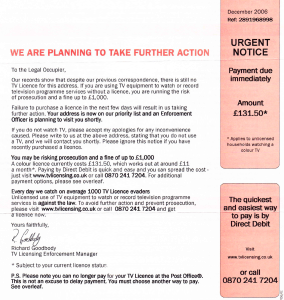
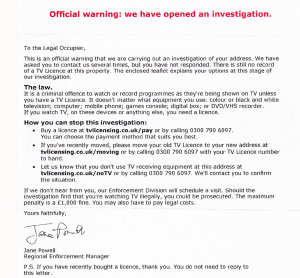
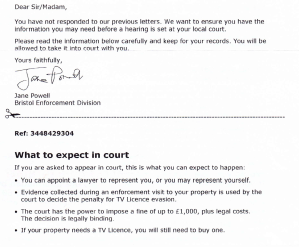
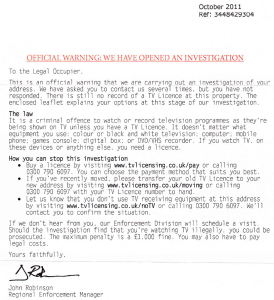
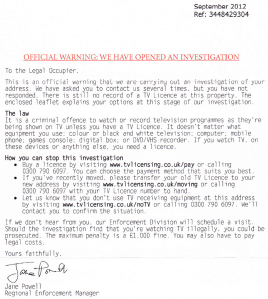
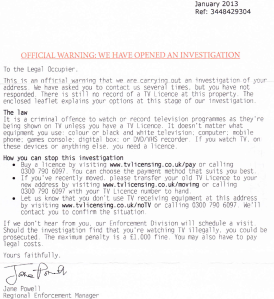
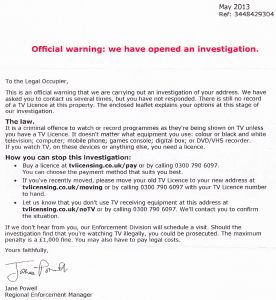
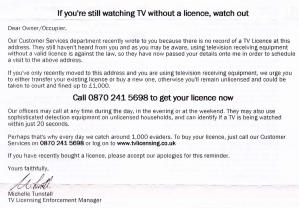
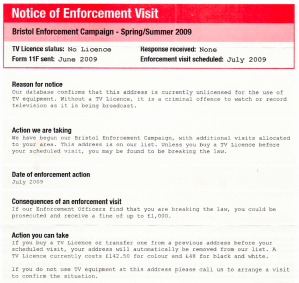
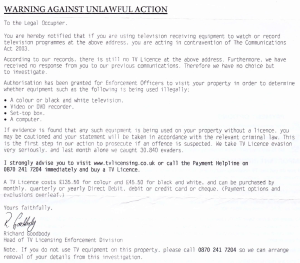

Hi,
here are some up to date numbers (nearly 140,000 prosecutions & out-of court disposals last year – 180k+ was pre 2016) https://endbbclicencefee.wordpress.com/
and here is the 2017 ‘Gender disparity report’ which absolve TV licensing (circumstances outside TV licensing’s control as they put it) https://www.tvlicensing.co.uk/ss/Satellite?blobcol=urldata&blobheadername1=content-type&blobheadervalue1=application%2Fpdf&blobkey=id&blobtable=MungoBlobs&blobwhere=1370006458780&ssbinary=true
Good article. We didn’t have a TV for a long time. I always made a point of sending back their letters unopened with a “Return to Sender – No Junk Mail Accepted” message written on the envelope.
Very good article and thank you for sharing (found via Twitter).
Found this recently:
1 https://www.whatdotheyknow.com/request/bbc_and_the_land_regsitry
which leads to a reply:
2 https://www.whatdotheyknow.com/request/66002/response/173526/attach/html/3/RFI20110362%20final%20response.pdf.html